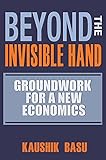Beyond the Invisible Hand : Groundwork for a New Economics / Kaushik Basu.
Material type: TextPublisher: Princeton, NJ : Princeton University Press, [2010]Copyright date: ©2010Edition: Course BookDescription: 1 online resource (312 p.)Content type:
TextPublisher: Princeton, NJ : Princeton University Press, [2010]Copyright date: ©2010Edition: Course BookDescription: 1 online resource (312 p.)Content type: - 9780691137162
- 9781400836277
- online - DeGruyter
- Issued also in print.
| Item type | Current library | Call number | URL | Status | Notes | Barcode | |
|---|---|---|---|---|---|---|---|
 eBook
eBook
|
Biblioteca "Angelicum" Pont. Univ. S.Tommaso d'Aquino Nuvola online | online - DeGruyter (Browse shelf(Opens below)) | Online access | Not for loan (Accesso limitato) | Accesso per gli utenti autorizzati / Access for authorized users | (dgr)9781400836277 |
Frontmatter -- Contents -- Preface -- Chapter 1. In Praise of Dissent -- Chapter 2. The Theory of the Invisible Hand -- Chapter 3. The Limits of Orthodoxy -- Chapter 4. The Economy According To Law -- Chapter 5. Markets And Discrimination -- Chapter 6. The Chemistry of Groups -- Chapter 7. Contract, Coercion, and Intervention -- Chapter 8. Poverty, Inequality, and Globalization -- CHAPTER 9. Globalization and the Retreat of Democracy -- Chapter 10. What is to be Done? -- Notes -- References -- Index
restricted access online access with authorization star
http://purl.org/coar/access_right/c_16ec
One of the central tenets of mainstream economics is Adam Smith's proposition that, given certain conditions, self-interested behavior by individuals leads them to the social good, almost as if orchestrated by an invisible hand. This deep insight has, over the past two centuries, been taken out of context, contorted, and used as the cornerstone of free-market orthodoxy. In Beyond the Invisible Hand, Kaushik Basu argues that mainstream economics and its conservative popularizers have misrepresented Smith's insight and hampered our understanding of how economies function, why some economies fail and some succeed, and what the nature and role of state intervention might be. Comparing this view of the invisible hand with the vision described by Kafka--in which individuals pursuing their atomistic interests, devoid of moral compunction, end up creating a world that is mean and miserable--Basu argues for collective action and the need to shift our focus from the efficient society to one that is also fair. Using analytic tools from mainstream economics, the book challenges some of the precepts and propositions of mainstream economics. It maintains that, by ignoring the role of culture and custom, traditional economics promotes the view that the current system is the only viable one, thereby serving the interests of those who do well by this system. Beyond the Invisible Hand challenges readers to fundamentally rethink the assumptions underlying modern economic thought and proves that a more equitable society is both possible and sustainable, and hence worth striving for. By scrutinizing Adam Smith's theory, this impassioned critique of contemporary mainstream economics debunks traditional beliefs regarding best economic practices, self-interest, and the social good.
Issued also in print.
Mode of access: Internet via World Wide Web.
In English.
Description based on online resource; title from PDF title page (publisher's Web site, viewed 30. Aug 2021)


